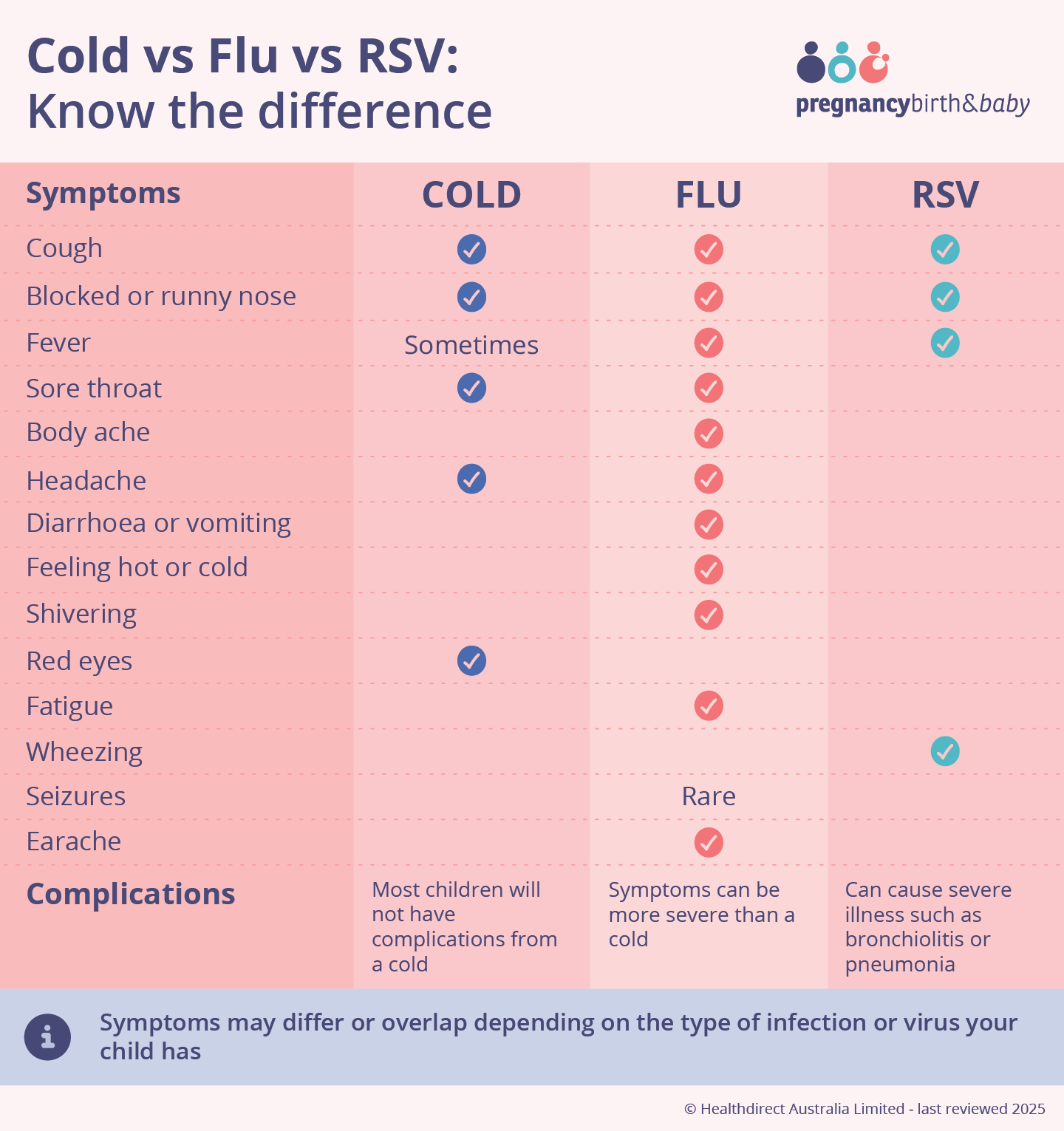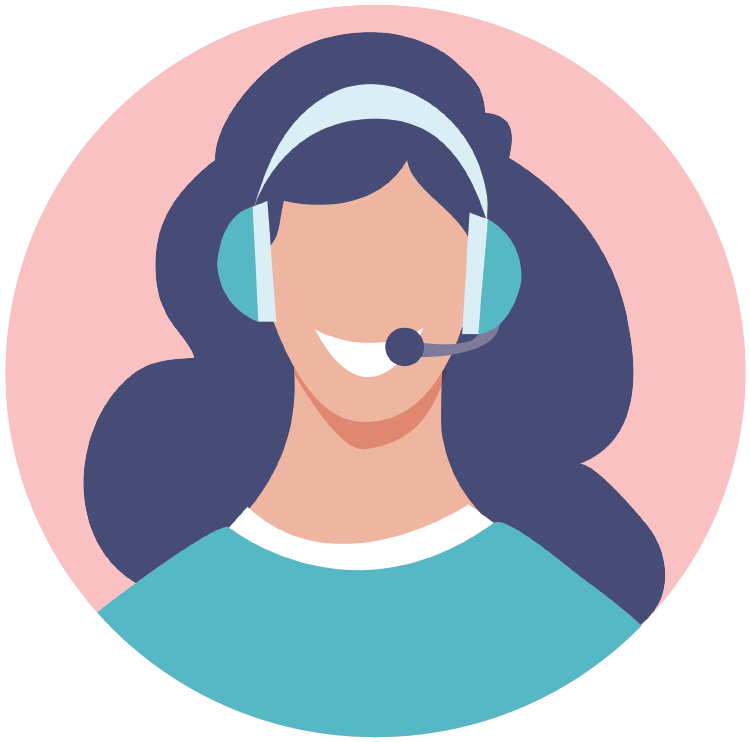Colds and flu in babies and children
11-minute read
Key facts
- A cold is an infection of the upper respiratory tract (airway) caused by a virus.
- Colds usually get better on their own but there are ways to help your child feel better as they recover.
- Influenza, also known as the flu, is a viral infection that can cause complications for some children.
- Flu vaccination is the best way to protect your child from catching the flu — it’s available free of charge for children under the age of 5 years.
- See a doctor straight away if your baby who is under 3 months of age has a fever.
What are colds and flu?
A cold is an infection of the upper respiratory tract (airway) that is caused by a virus. Colds often get better on their own after a few days.
Influenza, also known as 'the flu', is an infection caused by the influenza virus. The flu can have serious complications for children.
Very young children may have had little or no previous contact with the viruses that cause colds and flu. This means they will have less protection against infection and are more likely to get sick than adults.
What are the symptoms of colds and flu?
Both colds and flu affect your upper airways (nose, mouth and throat).
Symptoms of a cold in babies and children
Symptoms of a cold will usually affect your child’s nose and throat, and can include:
- blocked or runny nose
- sneezing
- sore throat
- cough
- headache
- fever (a temperature of 38°C or higher)
Symptoms of flu in babies and children
Symptoms of the flu are similar to symptoms of a cold but will often come on more quickly. Symptoms usually last about a week.
The flu may also cause symptoms such as:

CHECK YOUR SYMPTOMS — Use the Symptom Checker and find out if you need to seek medical help.
What causes a cold or flu?
Colds and flu are caused by viruses.
There are many types of viruses that can cause a cold.
There are two main types of influenza virus — Type A and Type B.
When should I see a doctor?
If at any time your child has trouble breathing, call triple zero (000) and ask for an ambulance.
A cold or flu will often get better without treatment.
If you are worried about your child’s symptoms, you should see your doctor. Children aged under 5 years of age, and especially those under 2 years of age, are more likely to become unwell from influenza.
Always see a doctor if your baby under 3 months of age has a fever.
See your doctor if your child has any breathing problems such as wheezing, or a cough that lasts more than 3 weeks.
You should also see your doctor if there is any worsening of your child's illness.

When to seek urgent care
You should get urgent medical advice if your baby or child has any of these symptoms:
- breathlessness (breathing very rapidly) or difficulty breathing
- bluish or very pale skin
- a high fever (or any fever in a baby under 3 months of age)
- is unable or unwilling to feed, eat or drink
- is not passing urine or is vomiting a lot
- has a fever with a rash
- decreasing alertness and activity
FIND A HEALTH SERVICE — The Service Finder can help you find doctors, pharmacies, hospitals and other health services.
How are colds and flu diagnosed?
Your doctor can diagnose a cold or flu. Your doctor will ask about your child’s symptoms. They might also take a swab from the inside of your child’s nose and throat to test for influenza.
How can I treat colds and flu in babies and young children?
Colds and flu are not usually dangerous for your child and will often get better on their own.
Self-care at home
There are ways to help ease the symptoms of a cold or flu.
Your baby may have trouble feeding if their nose is blocked. Proper feeding is important to keep them hydrated.
Babies with colds and flu need:
- cuddles and reassurance
- smaller, more frequent feeds
- extra sleep
Like babies, young children with infections also need:
- rest
- warmth
- nourishing food
- plenty of fluids
Medicines for colds and flu
Ask your doctor or pharmacist if your child can use nasal drops. This can help them breathe while they feed. It’s important to only use nasal drops made for children.
Babies and young children can take paracetamol in liquid form to help with pain and fever. You can give older children paracetamol as a chewable tablet.
Children over 3 months of age can also take ibuprofen. It can be given alone, or with paracetamol. Make sure to read the label for the recommended dose based on your child's age and weight.
Your doctor may prescribe your child an antiviral medicine. This can be given as a liquid for young children and babies.
There are some medicines that are not suitable for children with a cold or flu, such as:
- antibiotics — these will not help your child recover from a cold or flu. This is because antibiotics only treat illnesses caused by bacteria and the flu is caused by a virus.
- aspirin — this is not safe for babies or young children and may have serious side effects.
- cold medicines — many cough and cold medicines such as nasal sprays are not safe for babies or children. Always follow the advice of your doctor or pharmacist.
LOOKING FOR A MEDICINE? — To search by brand name or active ingredient, use the Medicines information search feature.
What are the complications of colds and flu in babies and young children?
Most children will not have complications from a cold.
Some children may have complications from the flu, but this is rare. These complications include:
- pneumonia (lung infection)
- otitis media (middle ear infection)
- sinusitis (sinus inflammation)
Some children may need to go to hospital to be treated.
Can colds and flu be prevented?
The best way to protect your child from the flu is through vaccination. It’s recommended that children over 6 months of age are vaccinated every year. If your child is under 6 months of age the best way to protect them is to make sure you are vaccinated.
The flu vaccine does not prevent colds.
You can help prevent the spread of colds by practising good hygiene. This includes:
- using soap and water to wash your hands often
- using tissues when you or your child sneezes or has a runny nose
- putting used tissues in the bin straight away
- teaching your child to wash their hands too
Stay at home when sick
If your child has a cold or flu, you should keep them at home until they are well. If your child attends a childcare centre, you should let the director know that your child is unwell. Childcare centres have rules about how long sick children should stay at home. This is to help stop the disease spreading to other children.

Free flu vaccination
The flu vaccination is free for many people under the National Immunisation Program. This includes:
- children under 5 years of age and over 6 months of age
- pregnant women
- Aboriginal and Torres Strait Islander people
- people with certain medical conditions
- people over 65 years of age
Speak to your doctor or pharmacist about your child’s free flu vaccination.
Resources and support
You can visit the Department of Health, Disability and Ageing to learn more about the influenza vaccine and children and influenza.
Languages other than English
The Department of Health, Disability and Ageing provides information about influenza vaccination in many community languages.

Speak to a maternal child health nurse
Call Pregnancy, Birth and Baby to speak to a maternal child health nurse on 1800 882 436 or video call. Available 7am to midnight (AET), 7 days a week.